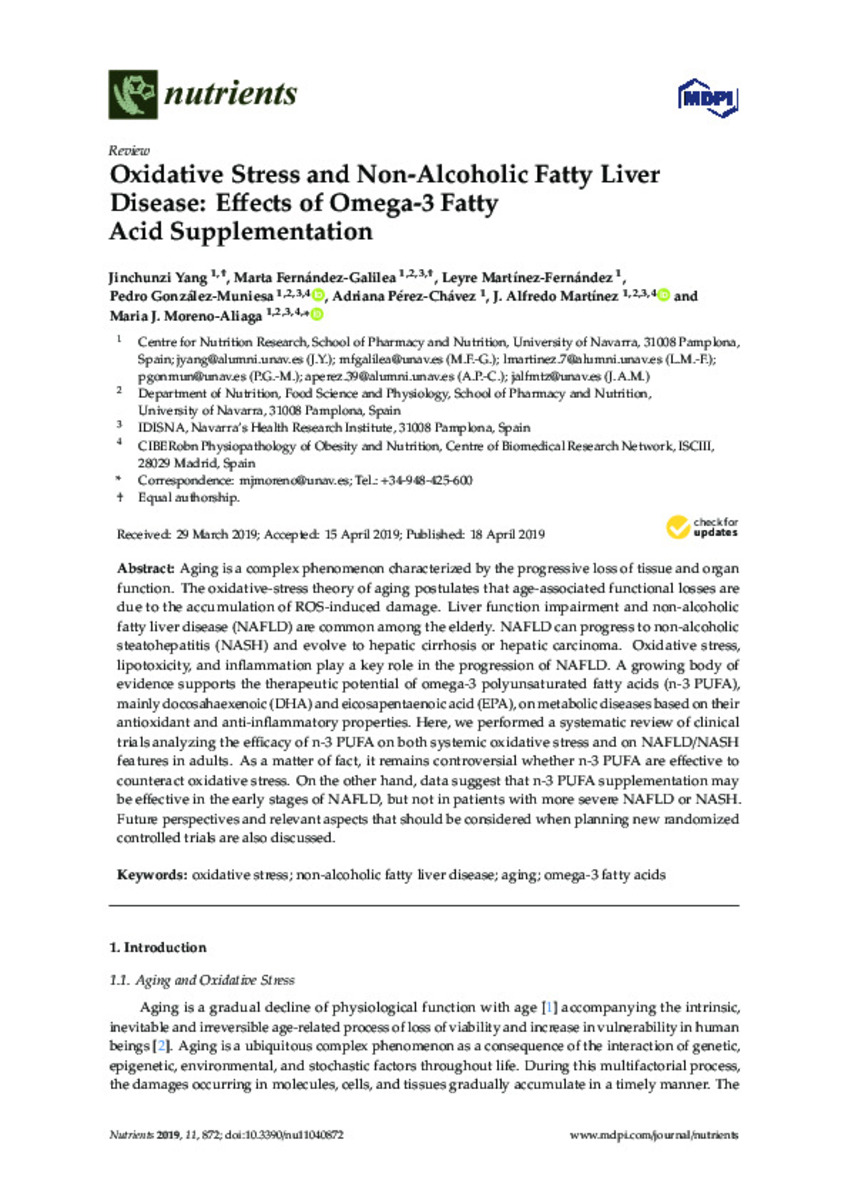Full metadata record
| DC Field | Value | Language |
|---|---|---|
| dc.creator | Yang, J. (Jinchunzi) | - |
| dc.creator | Fernandez-Galilea, M. (Marta) | - |
| dc.creator | Martínez-Fernández, L. (Leyre) | - |
| dc.creator | Gonzalez-Muniesa, P. (Pedro) | - |
| dc.creator | Pérez-Chávez, A. (Adriana) | - |
| dc.creator | Martinez, J.A. (José Alfredo) | - |
| dc.creator | Moreno-Aliaga, M. J. (María Jesús) | - |
| dc.date.accessioned | 2021-11-11T09:16:48Z | - |
| dc.date.available | 2021-11-11T09:16:48Z | - |
| dc.date.issued | 2019 | - |
| dc.identifier.citation | Yang, J. (Jinchunzi); Fernandez-Galilea, M. (Marta); Martínez-Fernández, L. (Leyre); et al. "Oxidative stress and non-alcoholic fatty liver disease: effects of omega-3 fatty acid supplementation". Nutrients. 11 (4), 2019, 872 | es_ES |
| dc.identifier.issn | 2072-6643 | - |
| dc.identifier.uri | https://hdl.handle.net/10171/62534 | - |
| dc.description.abstract | Aging is a complex phenomenon characterized by the progressive loss of tissue and organ function. The oxidative-stress theory of aging postulates that age-associated functional losses are due to the accumulation of ROS-induced damage. Liver function impairment and non-alcoholic fatty liver disease (NAFLD) are common among the elderly. NAFLD can progress to non-alcoholic steatohepatitis (NASH) and evolve to hepatic cirrhosis or hepatic carcinoma. Oxidative stress, lipotoxicity, and inflammation play a key role in the progression of NAFLD. A growing body of evidence supports the therapeutic potential of omega-3 polyunsaturated fatty acids (n-3 PUFA), mainly docosahaexenoic (DHA) and eicosapentaenoic acid (EPA), on metabolic diseases based on their antioxidant and anti-inflammatory properties. Here, we performed a systematic review of clinical trials analyzing the efficacy of n-3 PUFA on both systemic oxidative stress and on NAFLD/NASH features in adults. As a matter of fact, it remains controversial whether n-3 PUFA are effective to counteract oxidative stress. On the other hand, data suggest that n-3 PUFA supplementation may be effective in the early stages of NAFLD, but not in patients with more severe NAFLD or NASH. Future perspectives and relevant aspects that should be considered when planning new randomized controlled trials are also discussed. | es_ES |
| dc.description.sponsorship | This research was funded by: Ministry of Economy, Industry and Competitiveness (MINECO-FEDER) of the Government of Spain (BFU2015-65937-R), Department of Health of the Navarra Government (67-2015) and CIBER Physiopathology of Obesity and Nutrition (CIBERobn), Carlos III Health Research Institute (CB12/03/30002). “Juan de la Cierva” Grant to M.F.-G. (IJCI-2016-30025). L.M.-F. was supported by an FPI predoctoral fellowship (Formación de Personal Investigador). The support from Nutrition Research Centre of the University of Navarra is also acknowledged. | es_ES |
| dc.language.iso | eng | es_ES |
| dc.publisher | MDPI AG | es_ES |
| dc.rights | info:eu-repo/semantics/openAccess | es_ES |
| dc.subject | Oxidative stress | es_ES |
| dc.subject | Non-alcoholic fatty liver disease | es_ES |
| dc.subject | Aging | es_ES |
| dc.subject | Omega-3 fatty acids | es_ES |
| dc.title | Oxidative stress and non-alcoholic fatty liver disease: effects of omega-3 fatty acid supplementation | es_ES |
| dc.type | info:eu-repo/semantics/article | es_ES |
| dc.description.note | © 2019 by the authors. Licensee MDPI, Basel, Switzerland. This article is an open access article distributed under the terms and conditions of the Creative Commons Attribution (CC BY) license (http://creativecommons.org/licenses/by/4.0/). | es_ES |
| dc.identifier.doi | 10.3390/nu11040872 | - |
| dadun.citation.number | 4 | es_ES |
| dadun.citation.publicationName | Nutrients | es_ES |
| dadun.citation.startingPage | 872 | es_ES |
| dadun.citation.volume | 11 | es_ES |
Files in This Item:
Statistics and impact
Items in Dadun are protected by copyright, with all rights reserved, unless otherwise indicated.






